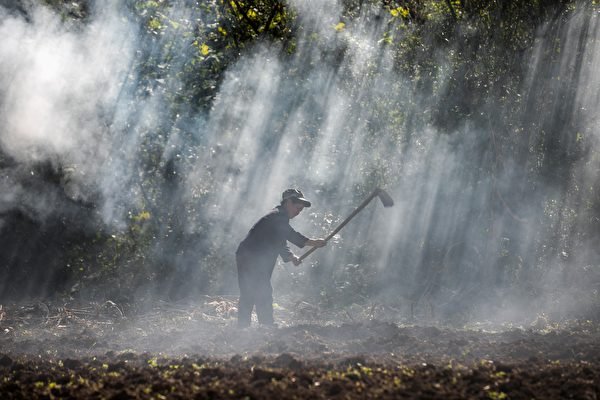On November 18, 2024, the deadline for paying the rural and urban residents’ medical insurance in mainland China for the new year, known as “Nonghe,” is at the end of December. Many Chinese farmers are considering giving up their insurance. With the economy slowing down and incomes decreasing, the renewal fee is a significant expense for small farmers. Some villagers have expressed that only foolish people would pay. The trend of “non-payment” for the new Nonghe insurance continues to expand, leading to irregularities in some areas in order to meet payment targets.
The payment period for the new year’s Nonghe insurance began in September this year, with an annual payment of 400 yuan per person, an increase of 20 yuan from 2023. There is only about a month left until the deadline. As for the progress of payments, due to the lack of specific statistics in different regions, it is difficult to obtain authoritative data on payment progress.
For a rural household with five members, the annual payment amounts to 2000 yuan. This sum is not insignificant for many rural families. Based on this amount, one would need to sell 1000 kilograms of corn at a price of around 2 yuan per kilogram to cover the annual cost.
Recent articles by influential figures like the online author “Rural People and Events” indicate that based on online and on-the-ground observations, the payment progress for the new Nonghe insurance is not optimistic. Many people are saying they do not plan to pay this year and are preparing to stop payments altogether.
According to a report by Hong Kong’s “Ming Pao” on November 18, in the current economic downturn, the trend of non-payment for the new Nonghe insurance has surfaced in rural areas across the country and is escalating. Farmers directly criticize the high fees, difficult reimbursements, and chaotic management of Nonghe.
Farmers in some villages/towns in Shandong, Hebei, and northeastern China generally feel that the rapid increase in Nonghe fees is becoming increasingly burdensome for them. Those with poor financial situations only pay for family members with health issues or choose not to pay at all.
The mismanagement of Nonghe is also a concern for farmers. The phenomenon of “insurance cash-out” is rampant, where private hospitals, clinics, and pharmacies profit by prescribing unnecessary medications to farmers using their insurance cards or by providing fake hospitalization and treatment documents for profit.
Despite the fact that patients need to pay for hospitalization costs and other expenses, hospitals often offer goods or services of equivalent value in return. However, this escalation of insurance costs has created a vicious cycle, leading some villagers to say that only fools pay as the money ends up benefiting those who are not actually ill.
Even the Chinese Communist Party (CCP) officials are aware of the problem of “insurance cash-out.” In October, the Deputy Director of the Fund Supervision Department of the National Health Insurance Administration, Xie Zhangshu, announced that as of September this year, suspected violations totaling 2.21 billion yuan have been discovered.
One of the reasons why many farmers are choosing to stop paying is due to the limited coverage of the new Nonghe insurance. Some farmers point out that major illnesses are not covered, and it is challenging to get reimbursement for essential medications, especially high-priced drugs. Additionally, the reimbursement percentage under Nonghe is relatively low, so most of the costs of hospitalization treatment have to be borne by individuals. Even for minor illnesses like colds and fevers, the medication expenses throughout the year may not reach 400 yuan.
Public data shows that the reimbursement percentages vary depending on the medical facility: 60% for village/central health clinics, 40% for town health centers, 30% for secondary hospitals, and 20% for large hospitals. For hospitalization, reimbursement rates are 60% for town health centers, 40% for secondary hospitals, and 30% for tertiary hospitals. In the case of a severe illness requiring treatment at a higher-level hospital with a cost of 1000 yuan, only 300 yuan can be reimbursed.
Although CCP officials claim that payment for Nonghe is voluntary and individuals can choose whether or not to pay, in recent years, there has been a trend of non-payment. Data indicates that there was a decrease of 8.07 million people in 2020, another decrease of 7.51 million people in 2021, and a dramatic drop of 25.17 million insured individuals in 2022, totaling over 40 million people who have stopped paying for Nonghe in these three years.
During the payment period, some regions have resorted to various tactics to ensure compliance with Nonghe payments. For example, in a recent incident in Sichuan, a school head directly informed parents in a group chat that classes would be suspended for students whose families had not paid their Nonghe dues until a parent-teacher meeting was held.
In a notice issued by a village committee in Yueyang County, Hunan Province, it was stated that those who had not paid their medical insurance fees would not receive any official seals or related procedures from the village committee, and individuals experiencing year-end difficulties would not be considered for assistance.
In other areas, Nonghe payments have been linked to receiving agricultural subsidies, applying for residential land, and other benefits. If payments are not made, subsidies may be withheld or suspended until Nonghe fees are paid, creating a coercive environment around Nonghe payments.
These issues surrounding Nonghe payments are all considered violations. “Rural People and Events” suggests that some village cadres believe it has become extremely difficult to collect these fees from farmers. The pressure to collect has fallen on the village cadres, forcing them to explore various methods to ensure compliance.

